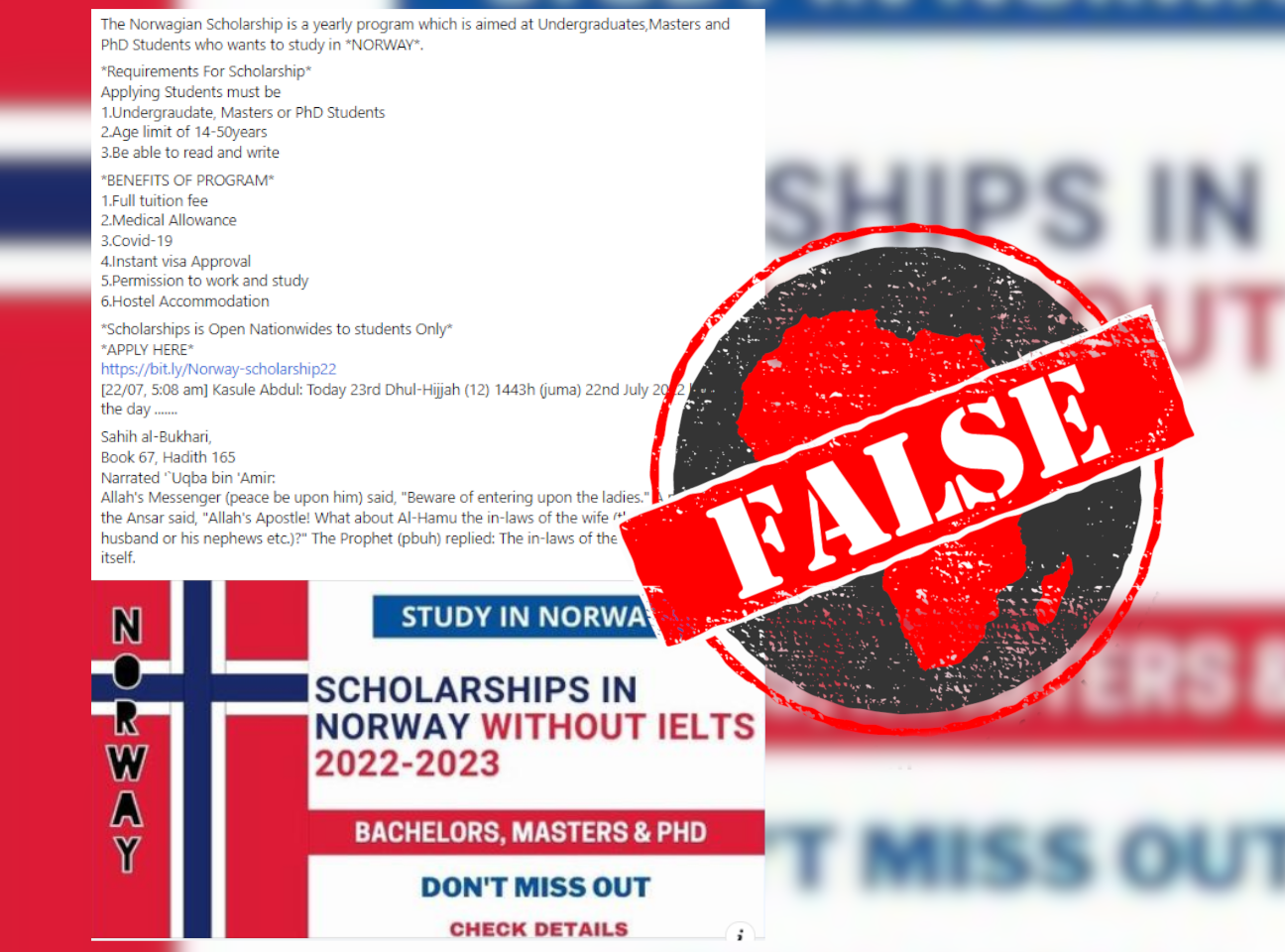IN SHORT: Links to a website offering scholarships at a Norwegian university have been shared across social media in Kenya, Zambia and Tanzania. But like similar offers we’ve seen before, these aren’t legitimate opportunities.
A website offering fully funded scholarships to study at a university in Norway is getting social media attention.
“Study in Norway With Course of Your Choice For Free through-out The years of program,” reads badly written text on the home page.
“The University Of Bergen Scholarship Program Enables International Students to Study in Norway Comfortably and Free. Applicants are to fill the form bellow and click on Apply,” it adds.
The amateur-looking site – norway.visa2abroad.online – has been circulating on WhatsApp in Kenya, and posted on public Facebook groups with thousands of members in Zambia, Eswatini and Tanzania.
The website displays an “application form” which asks for personal details like name, email, the country of residence and the programme one intends to study.
But is the website and information about the Norwegian scholarship legit? We checked.

Signs of scam
The links on social media claim you can “Apply for Fully Funded University of Oslo Scholarship In Norway”, not the University of Bergen, as the website says.
Oslo, Norway’s capital, and Bergen, the country’s second-largest city on the North Sea coast, are 460 kilometres apart. Both cities have top-ranked universities. However, this discrepancy between the description of the offer on social media and on the website featuring the application form is a red flag.
It’s also unlikely that legitimate scholarships would be advertised on a badly designed website with poorly written text.
When we opened the link on our computer, the antivirus program warned that it was a “malicious” link. We nevertheless opened it to find more about the offer, though this is another red flag that the website may be a phishing attempt.
We left the “application form” blank deliberately and clicked “APPLY NOW”. Suspiciously, we were informed that our application had been received and we were directed to the next stage.
Here, we were asked about our level of education, age and what city we would like to study in.
After filling in the details, a message popped up saying that we had been approved to complete our visa registration for the “University of Bergen scholarship”.
“You may get the visa form with only one step, kindly click the ‘Invite Friends/Group’ button below to share this information with 15 friends or 5 groups on WhatsApp so That They Can Aslo Benefit,” the next message read.
This is an example of engagement bait - social media posts that ask people to interact by liking, commenting or sharing.
While this increases the post’s reach, it ultimately offers no reward, and certainly no visa. Such links may also be attempts to steal valuable personal information.
The website gives no link to the University of Oslo and University of Bergen websites. This is also a good indication that there is no real connection to these universities or any scholarships offered by them.
To help protect yourself against online fraudsters, read our guide to Facebook scams and how to spot them.
Republish our content for free
For publishers: what to do if your post is rated false
A fact-checker has rated your Facebook or Instagram post as “false”, “altered”, “partly false” or “missing context”. This could have serious consequences. What do you do?
Click on our guide for the steps you should follow.
Publishers guideAfrica Check teams up with Facebook
Africa Check is a partner in Meta's third-party fact-checking programme to help stop the spread of false information on social media.
The content we rate as “false” will be downgraded on Facebook and Instagram. This means fewer people will see it.
You can also help identify false information on Facebook. This guide explains how.




Add new comment